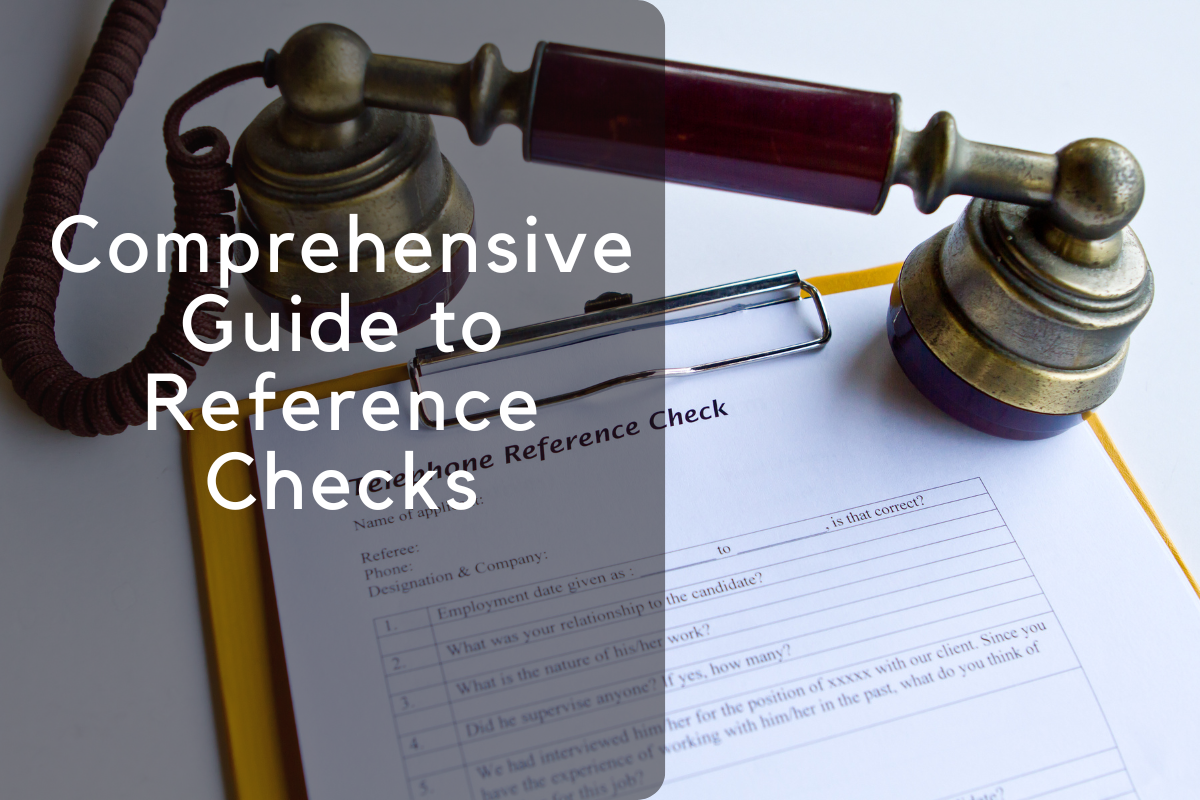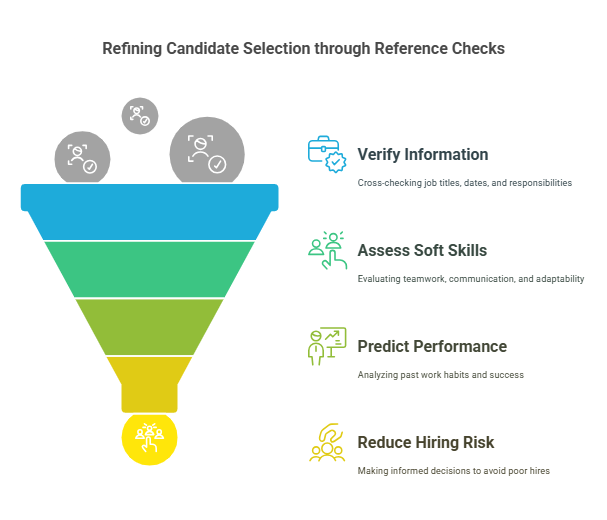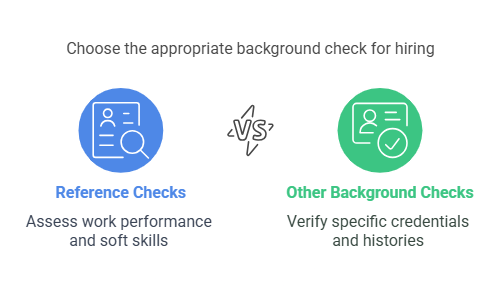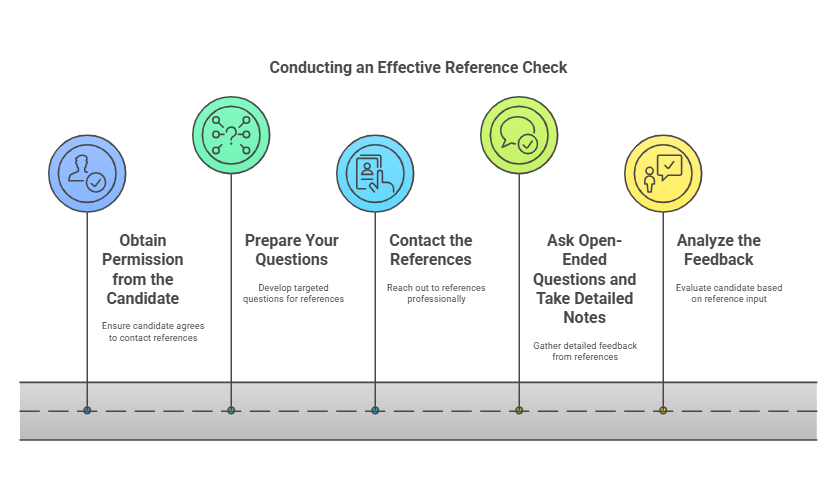Table of Contents
ToggleWhat is a Reference Check and Why is It Crucial in Hiring?

A reference check is a process in which an employer contacts a candidate’s provided references—typically previous employers, colleagues, or other professional contacts—to verify details about the candidate’s job performance, work ethic, and qualifications. This step occurs after a candidate has undergone interviews and is typically conducted before extending a formal job offer.
Reference checks provide employers with an opportunity to gather additional information that may not be fully captured in resumes, cover letters, or interviews. They serve as a critical tool to confirm a candidate’s suitability for the position and their alignment with the company’s needs. In this section, we’ll explore the significance of reference checks in the hiring process.
Why Reference Checks Are Important for Employers

- Verification of Information: One of the primary reasons employers conduct reference checks is to verify the information provided by candidates. Resumes and interviews may present a polished version of the candidate, but reference checks allow employers to cross-check those details with those who have worked directly with the individual. By confirming job titles, employment dates, and responsibilities, reference checks can reveal discrepancies or inconsistencies that could indicate exaggerations or falsifications.
- Assessing Soft Skills and Cultural Fit: While qualifications, certifications, and experience are essential, they don’t always provide the full picture of a candidate’s ability to thrive in a workplace environment. Reference checks offer insights into a candidate’s soft skills—such as teamwork, communication, problem-solving, and adaptability—that are crucial for long-term success. Understanding how a candidate collaborates with others, handles challenges, and contributes to a team can help employers determine whether they are a good cultural fit for the company.
- Predicting Future Performance: A reference check allows employers to gain an understanding of how a candidate performed in previous roles. Feedback from a past employer or colleague regarding a candidate’s work habits, productivity, and success in past positions can provide a reliable indicator of how they might perform in the new role. Reference checks offer valuable context to a candidate’s potential, helping employers predict how they will handle similar challenges and responsibilities in the future.
- Reducing Hiring Risk: The hiring process can be time-consuming and expensive, and making a poor hiring decision can have significant consequences. Reference checks help mitigate hiring risks by offering a more comprehensive view of a candidate’s qualifications and behavior in a professional setting. By obtaining feedback from trusted individuals, employers can make more informed decisions and avoid the costs associated with turnover, training, or legal issues.
Verifying Job-Related Information
One of the core purposes of a reference check is to verify the job-related information a candidate has provided. Employers are interested in validating details such as:
- Employment History: Ensuring that the candidate worked at the listed organizations for the appropriate duration and held the specified positions.
- Job Performance: Assessing the candidate’s actual job performance, including their contributions, accomplishments, and any challenges faced during employment.
- Skills and Qualifications: Confirming that the candidate possesses the necessary skills, knowledge, and qualifications required for the role in question.
- Behavior and Attitude: Understanding the candidate’s attitude towards work, including their approach to teamwork, leadership, and handling stress.
These factors help ensure that employers are hiring candidates with the right background and mindset to succeed in the new role.
Key Differences Between Reference Checks and Other Background Checks

It’s important to distinguish reference checks from other types of background checks that employers might conduct during the hiring process. While they serve similar purposes in terms of gathering additional information, each type of check focuses on different aspects of a candidate’s background.
- Criminal Background Checks: These checks are designed to identify any criminal history that may impact a candidate’s suitability for a job. Criminal background checks are typically conducted through public records and databases, whereas reference checks rely on feedback from individuals who have directly worked with the candidate.
- Credit Checks: Credit checks are most commonly used for positions involving financial responsibilities. They help employers assess a candidate’s financial history and how they handle financial obligations. Reference checks, on the other hand, do not focus on financial history but instead offer a broader view of the candidate’s work performance.
- Employment Verification: While reference checks often include verification of employment history, employment verification specifically confirms dates of employment, job titles, and positions held. Reference checks go beyond verifying this basic information, providing qualitative feedback on the candidate’s job performance, interpersonal skills, and overall suitability for the role.
- Educational Verification: Employers may also conduct checks to confirm the educational qualifications listed by the candidate. Educational verification ensures that the candidate attended the stated institutions and earned the claimed degrees or certifications. Unlike reference checks, which focus on professional experiences, educational verification centers on academic credentials.
A reference check is a vital component of the hiring process, offering employers an opportunity to confirm a candidate’s qualifications, work history, and suitability for the role. It helps provide a clearer picture of the candidate’s performance and soft skills, ensuring that they are a good fit for the company’s culture and needs. While reference checks differ from other background checks, they remain a crucial step in minimizing hiring risks and making informed, effective decisions.
How to Conduct an Effective Reference Check A Step-by-Step Guide
Conducting a reference check is a critical step in the hiring process that can provide invaluable insights into a candidate’s qualifications, behavior, and performance in a professional environment. However, the process must be approached methodically to ensure that it is effective and provides accurate, useful information. In this section, we’ll explore a step-by-step guide for employers on how to conduct an effective reference check.

Step 1: Obtain Permission from the Candidate
Before reaching out to references, it’s essential to obtain explicit permission from the candidate. This step is not only a professional courtesy but also a necessary part of maintaining trust. Candidates may provide you with a list of references, but it’s crucial to ask for confirmation that they are comfortable being contacted.
- Why It’s Important: Obtaining permission ensures that the candidate is aware of and agrees to having their references contacted. It also gives you the chance to clarify how the reference check will be conducted, making the process more transparent and ethical.
- What to Do: Ask the candidate to confirm the names, titles, and contact details of their references. Also, inquire about the relationship between the candidate and the reference, whether it’s a supervisor, colleague, or mentor.
Step 2: Prepare Your Questions
Once you have received permission, the next step is to prepare a set of targeted questions. These questions should be designed to extract useful information about the candidate’s qualifications, work ethic, and performance. Reference check questions can be divided into different categories to ensure that you are gathering all the necessary details.
- Why It’s Important: Well-structured, open-ended questions help you gather detailed, relevant feedback. Avoid questions that may lead to biased or vague responses.
- Types of Questions: Here are the key areas to focus on when crafting your questions:
- Job Performance: Questions aimed at evaluating the candidate’s job responsibilities and achievements.
- Example: “Can you describe the candidate’s primary responsibilities during their time with your company?”
- Example: “How did the candidate handle challenges or difficult tasks?”
- Work Ethic: Questions designed to assess the candidate’s commitment, reliability, and time management skills.
- Example: “Was the candidate punctual and dependable?”
- Example: “How did the candidate prioritize their tasks and manage deadlines?”
- Interpersonal Skills: Questions that help assess the candidate’s ability to work with others and navigate professional relationships.
- Example: “How well did the candidate collaborate with team members and management?”
- Example: “Was the candidate able to communicate effectively with colleagues?”
- Strengths and Weaknesses: Questions that give insight into the candidate’s capabilities and areas for improvement.
- Example: “What are the candidate’s strongest skills and contributions?”
- Example: “What areas do you think the candidate could improve in?”
- Reason for Leaving: Questions that reveal why the candidate left their previous position and whether any issues arose during their employment.
- Example: “Why did the candidate leave your company?”
- Example: “Were there any performance or behavioral issues that contributed to their departure?”
- Job Performance: Questions aimed at evaluating the candidate’s job responsibilities and achievements.
Step 3: Contact the References
Now that you’ve prepared your questions, it’s time to reach out to the references. When contacting a reference, whether by phone or email, be professional and clear about your purpose. Set up a convenient time for a call if needed, and respect the reference’s time.
- Why It’s Important: Being respectful and professional when contacting references helps ensure you get their full cooperation and maintain a positive reputation for your company.
- What to Do: When initiating the reference check, introduce yourself, explain the purpose of the call, and confirm that the person is available to provide feedback. Be polite and concise in your questioning to avoid taking up too much of their time.
Step 4: Ask Open-Ended Questions and Take Detailed Notes
During the reference check, ask your prepared questions but be open to following up based on the responses you receive. Open-ended questions encourage detailed answers and provide a fuller picture of the candidate’s performance. Additionally, be sure to take thorough notes during the conversation to capture key insights.
- Why It’s Important: Open-ended questions give you more meaningful feedback, and taking detailed notes ensures that you have a comprehensive record of the conversation for future reference.
- What to Do: Allow the reference to elaborate on their responses. Avoid interrupting, and ask for examples or clarification if needed. Taking notes during the conversation will also help you remember specific details later when you compare references or make a final decision.
Step 5: Analyze the Feedback
After conducting the reference checks, review the feedback you have received to evaluate the candidate’s qualifications and suitability for the role. Look for patterns in the responses, such as recurring strengths or weaknesses, and assess how the feedback aligns with the information provided by the candidate during interviews.
- Why It’s Important: Analyzing the feedback objectively helps you make an informed decision based on multiple perspectives.
- What to Do: Compare the information from the reference checks with the candidate’s resume, interview performance, and any other background checks. Use this combined information to evaluate the candidate’s overall fit for the role.
Key Reference Check Questions to Ask
Here is a table summarizing common and effective reference check questions for each area of evaluation:
| Category | Example Questions |
|---|---|
| Job Performance | – “Can you describe the candidate’s main responsibilities?” – “How did the candidate handle pressure or tight deadlines?” |
| Work Ethic | – “Was the candidate reliable and punctual?” – “Did they demonstrate a strong work ethic and take initiative?” |
| Interpersonal Skills | – “How did the candidate interact with colleagues and supervisors?” – “Was the candidate a team player?” |
| Strengths & Weaknesses | – “What would you say are the candidate’s greatest strengths?” – “Were there areas where the candidate struggled or needed improvement?” |
| Reason for Leaving | – “What was the reason the candidate left your organization?” – “Did the candidate leave on good terms?” |
Conducting an effective reference check involves several important steps, including obtaining permission from the candidate, preparing thoughtful questions, contacting references, and carefully analyzing the feedback. Following these steps will help you gain valuable insights into a candidate’s job performance, work ethic, and overall suitability for the role. By asking the right questions and thoroughly assessing the information provided, you can make better hiring decisions and reduce the risks associated with bad hires.
Best Practices, Common Questions, and Conclusion on Reference Checks
Conducting reference checks is a crucial part of the hiring process, but it requires careful planning and adherence to best practices to ensure fairness and effectiveness. In this section, we’ll answer some of the most common questions about reference checks, outline best practices for employers, and provide tips on how to navigate challenges during the process.
Frequently Asked Questions About Reference Checks
Reference checks are not legally required in most cases, but they are an important step to verify a candidate’s qualifications and past performance. Some employers may choose to conduct reference checks as part of their due diligence process to reduce the risk of hiring someone who may not be suited for the role or who might provide inaccurate information. However, employers should follow legal and ethical guidelines to avoid discrimination or privacy violations during the process. Employers can ask for both positive and negative feedback during a reference check, but it’s important to ensure that the questions are job-related and do not violate any discrimination laws. For example, asking about a candidate’s work performance or behavior during employment is appropriate, but asking about personal matters, such as age or family status, could be seen as discriminatory. The reference should be given the opportunity to respond truthfully, and the employer must be cautious to avoid making decisions based solely on one negative comment. Reference checks are typically conducted after the candidate has passed the interview stage and before a job offer is formally made. At this point, employers can be reasonably confident in the candidate’s qualifications and fit for the role. Conducting reference checks after the interview but before extending an offer allows employers to confirm the candidate’s performance history and verify any information that may not have been fully captured in the interview or resume. While candidates can certainly ask their references to provide feedback on their behalf, they cannot force an employer to conduct a reference check. Typically, employers will ask for permission from the candidate to contact the provided references. In some cases, candidates may request specific references to be contacted, especially if they have close relationships with them or believe that these references will provide strong recommendations. Negative references can be tricky to navigate, but it’s important to approach them professionally. If you receive negative feedback, try to assess the situation objectively and consider the context of the reference. Is the feedback based on isolated incidents, or is it a consistent pattern? You can also follow up with the candidate to discuss the negative reference. Sometimes, candidates may offer explanations or clarifications that can help provide a fuller picture. It’s important to make hiring decisions based on a comprehensive understanding of the candidate’s background, not just one negative reference.
Are reference checks legally required?
Can an employer ask for negative feedback during a reference check?
When should a reference check be conducted in the hiring process?
Can a candidate request a reference check?
How do I handle a negative reference?
Best Practices for Employers Conducting Reference Checks
To ensure that your reference checks are effective, fair, and legally compliant, here are some best practices that employers should follow:
1. Be Consistent and Structured
- Create a standardized set of questions for all candidates to ensure consistency in your reference checks. This will help you gather comparable feedback and reduce any potential bias in the process.
- Consider creating a reference check template or form to guide your questions and note-taking, which will help keep the process organized and efficient.
2. Be Transparent and Ask for Permission
- Always inform candidates that you will be conducting reference checks and ask for their permission before contacting their references. Transparency builds trust and ensures the candidate is prepared for this step in the hiring process.
3. Focus on Job-Relevant Questions
- Keep your questions focused on the candidate’s job performance, skills, and qualifications. Avoid delving into personal matters or asking about the candidate’s age, gender, or other protected characteristics, as this could lead to legal issues.
- If you ask about weaknesses or challenges, make sure the questions are related to the job and work performance, not personal characteristics.
4. Maintain Confidentiality
- Treat the information provided by references as confidential. Ensure that the reference check is conducted in a private setting, and the information gathered is only shared with relevant decision-makers within the hiring team.
5. Be Respectful of the Reference’s Time
- References are often providing feedback in addition to their regular work duties, so it’s important to respect their time. Keep reference check calls brief and focused on your main questions, and express gratitude for their participation.
6. Follow Up on Incomplete or Vague Responses
- If you receive vague or incomplete answers during a reference check, politely ask the reference to elaborate. Asking for specific examples can help clarify responses and provide a more accurate picture of the candidate’s abilities.
7. Document Everything
- Keep detailed notes of all reference check conversations, including the questions asked and the responses received. Documentation not only provides a record of your hiring process but also helps you review feedback objectively when comparing candidates.
How to Ensure a Fair and Ethical Reference Check Process
Ensuring that the reference check process is both fair and ethical is critical to avoid discrimination and protect the rights of all candidates. Here are a few steps you can take to uphold fairness:
- Follow Equal Opportunity Guidelines: Ensure that all candidates are subject to the same reference check process, regardless of their background, gender, or other personal characteristics. This helps prevent any form of discrimination.
- Don’t Rely on One Source: Reference checks should be only one part of your decision-making process. Rely on other factors, such as interviews, skills assessments, and background checks, to make a well-rounded and fair decision.
- Ensure Confidentiality: Share reference check feedback only with individuals involved in the hiring process. The information gathered should be used solely for the purpose of making an informed hiring decision.
Conclusion
Reference checks are an essential part of the hiring process that help employers assess a candidate’s qualifications, work ethic, and cultural fit. By following best practices and asking the right questions, employers can obtain valuable insights that support their hiring decisions. Additionally, it is important to maintain a fair, consistent, and ethical process to ensure that all candidates are treated equally and that decisions are made based on accurate and relevant information.
By adhering to these practices, employers can use reference checks as a powerful tool to make more informed, effective hiring decisions and minimize risks associated with bad hires.
